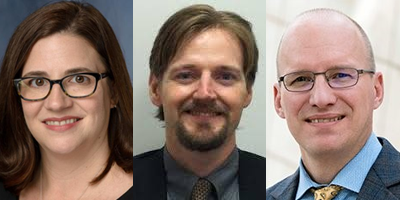
In the annual Research Round Up series, Cancer.Net Editorial Board members answer the questions, “What was the most exciting or practice-changing research in your field presented at the 2021 ASCO Annual Meeting, and what does it mean for people with cancer?” In this webinar, Cancer.Net Associate Editors Merry Jennifer Markham, MD, FACP, FASCO; Ryan J. Sullivan, MD; and William Dale, MD, PhD, discuss new and ongoing research in gynecologic cancers, melanoma, and geriatric oncology, or cancer in people age 65 or older.
-
Results from a study that looked at data to find out how human papillomavirus (HPV) vaccination and cancer screening has impacted the incidence of HPV-related cancers in the United States over the last 15 years. [4:08]
-
Findings from the phase III OUTBACK clinical trial, which studied whether giving additional chemotherapy after chemoradiation, which is chemotherapy and radiation therapy given at the same time, to people with locally advanced cervical cancer helped them live longer compared with chemoradiation alone. [9:06]
-
Follow-up results at 6 and a half years from the phase III CheckMate 067 clinical trial, which looked at whether treating people with advanced melanoma using the immunotherapy drugs ipilimumab (Yervoy) or nivolumab (Opdivo) either in combination or alone stopped the cancer from growing and helped patients live longer. [14:09]
-
Results from the phase III RELATIVITY-047 clinical trial, which tested whether a new immunotherapy drug called relatlimab given in combination with nivolumab for advanced melanoma prevented cancer growth better than nivolumab alone. [21:02]
-
An update from a clinical trial looking to see whether a type of T-cell therapy called tumor infiltrating lymphocyte (TIL) therapy using lifileucel (LN-144) helped shrink the tumors of people with advanced melanoma who were no longer benefitting from a type of immunotherapy called an immune checkpoint inhibitor. [25:16]
-
Results from a database study evaluating how common pre-existing dementia (either Alzheimer’s disease or a related dementia) is in people with cancer age 65 or older. [29:58]
-
Results from a phase II study evaluating whether exercise and low-dose ibuprofen either alone or in combination could improve attention and cognitive function in people receiving chemotherapy who are experiencing cancer-related cognitive difficulties, or “chemobrain.” [33:56]
-
Findings from a study evaluating the frequency of pre-existing geriatric conditions, such as functional problems, cognitive difficulties, and falls, in people 65 or older who are expected to live less than 1 year. [37:38]
-
A Q&A with the expert panelists. [42:49]
Dr. Markham is Chief of the Division of Hematology and Oncology and a clinical professor in the Department of Medicine at the University of Florida. She is also the 2021 Cancer.Net Associate Editor for Gynecologic Cancers. Dr. Sullivan is board certified in medical oncology and an attending physician in the Division of Hematology/Oncology at Massachusetts General Hospital. He is also the 2021 Cancer.Net Associate Editor for Melanoma and Skin Cancer. Dr. Dale is a clinical professor, the Arthur M. Coppola Family Chair in Supportive Care Medicine, and director of the Center for Cancer and Aging at City of Hope Comprehensive Cancer Center. He is also the 2021 Cancer.Net Associate Editor for Geriatric Oncology.
Disclosure information for this webinar’s speakers can be found in their individual biographies, which are linked in the paragraph above.
Cancer.Net podcasts and webinars are edited for length and content.
Was this webinar useful? Please subscribe, rate, and review Cancer.Net Podcasts wherever you listen to podcasts. This prerecorded webinar can be listened to online or downloaded to your computer. A transcript is also available. For more information, visit the Cancer.Net podcast page.
